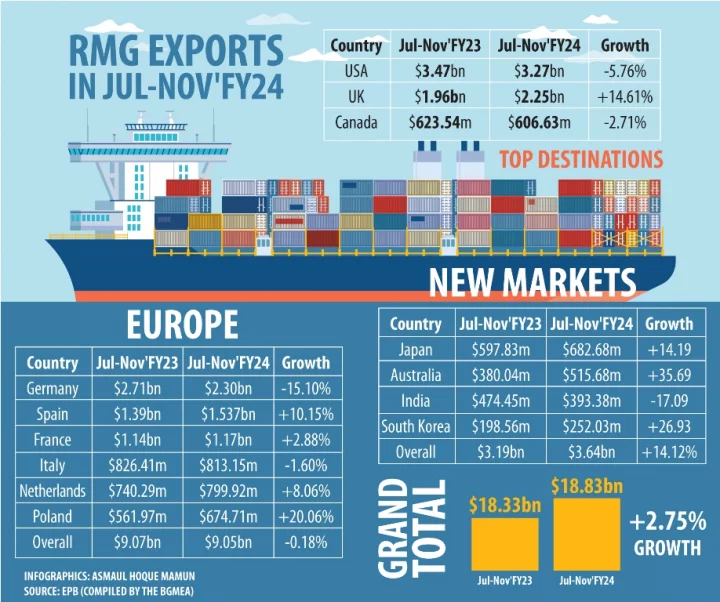বাংলাদেশি পোশাক শ্রমিকদের ন্যায্য মজুরির দাবিতে এএএফএ’কে মার্কিন আইনপ্রণেতাদের চিঠি
বাংলাদেশ প্রতিবেদক: বাংলাদেশি পোশাক শ্রমিকদের ন্যায্য মজুরি সমর্থন এবং শ্রম রক্ষার দাবিতে আমেরিকান অ্যাপারেল অ্যান্ড ফুটওয়্যার অ্যাসোসিয়েশনের (এএএফএ) কাছে সম্প্রতি একটি চিঠি পাঠিয়েছেন মার্কিন প্রতিনিধি পরিষদের সদস্য ইলহান ওমর, জিম ম্যাকগভর্ন এবং জান শাকোস্কি। চিঠিতে প্রতিনিধি পরিষদের সদস্য রাউল গ্রিজালভা, বারবারা লি, আলেকজান্দ্রিয়া ওকাসিও-কর্টেজ, ডেভিড ট্রোন এবং সুসান ওয়াইল্ড-ও স্বাক্ষর করেছেন। ইলহান ওমরের ওয়েবসাইটে এই চিঠির বিস্তারিত প্রকাশ করা হয়েছে।
চিঠিতে এসব আইনপ্রণেতা লিখেছেন, আমরা আমেরিকান অ্যাপারেল অ্যান্ড ফুটওয়্যার অ্যাসোসিয়েশনকে (এএএফএ) বাংলাদেশের পোশাক শ্রমিকদের ন্যায্য মজুরির দাবিকে জোরালোভাবে সমর্থন করার জন্য অনুরোধ জানাচ্ছি । আপনারা জানেন, বাংলাদেশের মজুরি বোর্ড ঘোষিত সাম্প্রতিক মজুরি বৃদ্ধি জীবনযাত্রার ক্রমবর্ধমান ব্যয় মেটাতে পারে না। এ বিষয়টি গণবিক্ষোভে পরিণত হয়। বিক্ষোভকারী এবং ট্রেড ইউনিয়ন নেতাদের বিরুদ্ধে সহিংসতার সাথে প্রতিক্রিয়া দেখিয়েছে পুলিশ। এর ফলে কমপক্ষে চারজনের মৃত্যু, অসংখ্য আহত, অন্যায্য গ্রেপ্তার, আটক এবং অনির্দিষ্টকালের জন্য কারখানা বন্ধের মতো ঘটনা ঘটেছে । আমরা প্রতিশোধ, সহিংসতা বা ভয়ভীতি ছাড়াই সংগঠিত, শান্তিপূর্ণভাবে প্রতিবাদ এবং সম্মিলিতভাবে দর কষাকষির জন্য শ্রমিকদের অধিকারকে সম্মান করতে বাংলাদেশ সরকারের প্রতি বাইডেন প্রশাসনের আহ্বানের সাথে একমত। পোশাক শ্রমিকদের জন্য একটি নতুন ন্যূনতম মজুরি নিয়ে সাম্প্রতিক আলোচনা ব্যাপক বিক্ষোভের সূচনা করেছে, যখন মজুরি বোর্ড মজুরি স্তরের অনেক নিচে বৃদ্ধির ঘোষণা দেয়। কারখানার মালিক ও পুলিশ বিক্ষোভের জবাব দিয়েছে ভয়ভীতি ও সহিংসতার মাধ্যমে।
মার্কিন ব্র্যান্ডগুলিকে অবশ্যই তাদের প্রভাব খাটাতে হবে এবং অবিলম্বে বাংলাদেশি শ্রমজীবী পরিবারের জন্য আরও ভাল মজুরি এবং অধিকারের দাবি জানিয়ে শ্রমিকদের পাশে দাঁড়াতে হবে।
এই চিঠিটি স্থানীয় শ্রমিক সংগঠন, আন্তর্জাতিক ট্রেড ইউনিয়ন এবং মার্কিন সরকারকে ন্যূনতম মজুরির সিদ্ধান্ত পুনর্বিবেচনা করতে এবং সমিতির স্বাধীনতা সহ শ্রমিকদের অধিকারকে সম্মানের দিকে দৃষ্টি নিক্ষেপ করে। চিঠিটি অনুমোদন করেছে অ্যাকাডেমিক্স স্ট্যান্ড এগেইনস্ট পোভার্টি, এশিয়ান প্যাসিফিক আমেরিকান লেবার অ্যালায়েন্স (এএফএল-সিআইও অ্যাফিলিয়েট), ইন্ডাস্ট্রিয়াল গ্লোবাল ইউনিয়ন, ইনস্টিটিউট ফর পলিসি স্টাডিজ-গ্লোবাল ইকোনমি প্রজেক্ট, লেবার বিহাইন্ড দ্য লেবেল, অক্সফাম আমেরিকা এবং ওয়ার্কার্স ইউনাইটেড (এসইআইইউ অ্যাফিলিয়েট)।
চিঠিতে একদিকে শ্রমিকদের বিরুদ্ধে পুলিশ এবং অন্যান্য নিরাপত্তা বাহিনীর সংঘটিত সহিংসতা অবিলম্বে বন্ধ করার আহ্বান জানানো হয়েছে। অন্যদিকে , বাংলাদেশের শ্রমিকদের মজুরি নির্ধারণের প্রক্রিয়া উন্নত করতে এবং শ্রমিকদের প্রতি মাসে ২০৮ ডলারের ন্যূনতম চাহিদা মেনে নেওয়ার জন্য বাংলাদেশ সরকার ও পোশাক প্রস্তুতকারকদের চাপ দেয়ার কথা বলা হয়েছে। ইতিমধ্যেই বেশ কয়েকটি মার্কিন ব্র্যান্ড মজুরি বৃদ্ধি এবং একটি ন্যায্য, স্বচ্ছ মজুরি নির্ধারণ প্রক্রিয়ার জন্য সমর্থন প্রকাশ করেছে , তবে শুধু প্রতিশ্রুতিই যথেষ্ট নয়। শ্রমিক সংগঠনের স্বাধীনতার অধিকার সহ শ্রম ও মানবাধিকার রক্ষার জন্য সদস্য কোম্পানির ব্যবসায়িক কার্যক্রম এবং সরবরাহ শৃঙ্খলে স্বচ্ছতা ও জবাবদিহিতা বৃদ্ধি করার আবেদন জানানো হয়েছে চিঠিতে। এছাড়াও শ্রমিকদের বিরুদ্ধে ফৌজদারি মামলা দায়ের বন্ধ করার জন্য সরবরাহকারীদের সতর্ক করার কথা বলা হয়েছে। বরখাস্ত করা, কালো তালিকাভুক্ত বা শ্রমিক ও ইউনিয়ন নেতাদের অন্যান্য হয়রানি সরবরাহশৃঙ্খলকে প্রভাবিত করবে বলে আশংকা প্রকাশ করা হয়েছে চিঠিতে। একইসঙ্গে মজুরি বিক্ষোভের প্রতিক্রিয়ায় শ্রমিক ও ইউনিয়ন নেতাদের গ্রেপ্তার বন্ধ করতে এবং আটক নির্দোষ ব্যক্তিদের অবিলম্বে মুক্তি দেওয়ার জন্য বাংলাদেশ কর্তৃপক্ষের প্রতি আহ্বান জানানোর বিষয়ে আমেরিকান অ্যাপারেল অ্যান্ড ফুটওয়্যার অ্যাসোসিয়েশনের প্রধান নির্বাহী কর্মকর্তা স্টিফেন ল্যামারকে আনুরোধ করা হয়েছে। সম্প্রতিক কারখানা বন্ধ থাকা সত্ত্বেও শ্রমিকদের বেতন প্রদান নিশ্চিত করতে পৃথক কারখানার মালিক এবং শিল্প সমিতির সাথে কথা বলার ওপর জোর দিয়েছেন প্রতিনিধিরা। রপ্তানি প্রক্রিয়াকরণ অঞ্চল (ইপিজেড) সেক্টরে কারখানা আছে এমন ব্র্যান্ডের মনে রাখা উচিত যে ইপিজেডগুলির নিজস্ব ন্যূনতম মজুরি বোর্ড রয়েছে, যা সম্প্রতি গঠিত হয়েছে। গার্মেন্টস সেক্টরের মতো সেখানে যাতে একই বিপর্যয়কর পরিস্থিতি তৈরি না হয় তা নিশ্চিত করতে ব্র্যান্ডের সম্পৃক্ততা একটি গুরুত্বপূর্ণ ভূমিকা পালন করতে পারে। ইপিজেড সেক্টরের কর্মীদের দারিদ্র্যমুক্তির জন্য সামনে আরো ভাল সুযোগ রয়েছে ।
চিঠির উপসংহারে বলা হয়েছে- আমরা বিশ্বাস করি যে বিদেশে আমাদের ক্রিয়াকলাপগুলি সর্বদা দেশে আমাদের মূল্যবোধকে প্রতিফলিত করবে। বাংলাদেশের গার্মেন্টস শ্রমিকরা যে ঐতিহাসিক চ্যালেঞ্জের সম্মুখীন হয়েছেন তা- ভাল বেতনের চাকরি, নিরাপদ কাজের পরিবেশ এবং সংগঠিত হওয়ার অধিকারের জন্য একটি যৌথ বৈশ্বিক সংগ্রামের অংশ। যখন আমরা বিশ্বের একটি অংশে শ্রমিকদের অধিকার সমর্থন করি, তখন আমরা সর্বত্র সেই অধিকারগুলির জন্য লড়াইকে জোরদার করি। আমরা আশা করি আমেরিকান অ্যাপারেল অ্যান্ড ফুটওয়্যার অ্যাসোসিয়েশন এই গুরুত্বপূর্ণ সুযোগটি গ্রহণ করবে এবং মার্কিন কোম্পানিগুলি অভ্যন্তরীণ ও বিশ্বব্যাপী শ্রমিকদের অধিকারকে অগ্রাধিকার দেবে। একটি জাতি হিসাবে আমরা যে গণতান্ত্রিক, অন্তর্ভুক্তিমূলক মূল্যবোধকে সমর্থন করি তার নিরিখে আমরা আপনাকে বাংলাদেশি শ্রমিকদের বিরুদ্ধে শোষণ বন্ধ করতে সাহায্য করার জন্য অনুরোধ করছি, যারা আপনার ব্যবসার বৃদ্ধি এবং মুনাফাকে ত্বরান্বিত করছে।
























